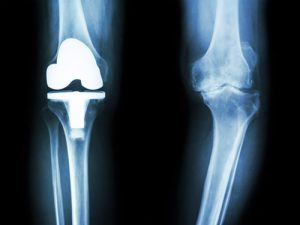Because our skeletons break down over years of use and misuse, the fact that researchers were able to develop artificial joints means we can live longer, more mobile, healthier lives. Artificial joints can replace hips and knees to help us maintain an active lifestyle.
Today’s total hip replacements can last more than two decades but if the patient has an adverse reaction to it, it could fail within five years. To extend the life span of artificial knees and hips, medical professionals understand the need to incorporate metals such as titanium or cobalt-chromium based alloys as those metals are more readily accepted by human biology.
Research scientists at the Department of Orthopedic Surgery at Rush University Medical Center have been analyzing implants, patients and the connection between why some fail, while others thrive for decades. They are looking for ways to prevent or decrease the incidents of joint replacement failure or rejection. Knowing when, or if, an implant will fail prior to the procedure lets the surgeons adjust the implant to eliminate these issues.
It’s been noted that more than 50,000 of these joint replacement procedures need to be redone annually. This means that in 2011 (the latest figures available) orthopedic surgeons implanted more than 300,000 total hip replacements in the United States and more than 50,000 of those needed to be replaced the same year. The reasons for the secondary replacement procedures vary from infection, a loosening of the prostheses or instability.
Revision surgery is not a 100% fix to the issue as the prostheses could potentially fail a second time if the underlying reason for the initial rejection has not been determined. An implant failure can occur because of an adverse reaction within the tissue surrounding implant to debris that results from the corrosion of the implant.
The data on why implants fail is far from conclusive, but researchers are studying patients, implants themselves and attempting to find ways to prevent failures so patients aren’t forced to undergo numerous procedures.
Universe Kogaku designs and manufactures optical lenses for medical procedures including joint replacement surgery. We also provide custom or standard lens assemblies for industrial, high tech and electronic applications, scanners, CCTV, CCD/CMOS, medical imaging, surveillance systems, machine vision and night vision systems.